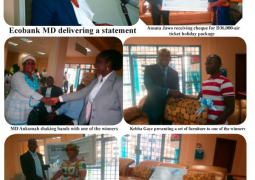The just concluded visit of the Libyan leader and current Chairman of the African Union to The Gambia is another breakthrough in our bilateral relationship.
Looking at it from the point of view of the two countries,
The visit is specifically significant for various reasons. One, it happened at a time when Brother Gaddafi had been invited as a Special Guest of Honour at the occasion marking the 15th Anniversary of the July 22nd Revolution that ushered in the Second Republic.
Whether it is a serious effort aimed at strengthening the relations between the two countries, Gaddafi as the Chairman of the African Union owes it to the rest of the African countries to honour their invitations in this turbulent time when the unification of the continent is badly needed.
Although this should not be seen as a political victory, it has accorded him the opportunity to consolidate his dream of African unity.
By all manifestations, it appears his Gambian counterpart has been impressed with his Al-Fatah-type of revolution, prompting him to follow his footsteps.
Unlike
These and a host of other factors have made the challenge of nation-building precarious and difficult to handle in those days when the founding fathers of the republic had to painstakingly toil to uplift the banner of independence.
This indeed gave birth to the few infrastructures in place at the time of the
No doubt, development in the 60's gave way to the ones in the 70's. Also, the ones in the 70's gave way to developments in the 80's, vice versa.
What remains now is therefore a collective will of all and sundry to put aside our differences and open a new chapter for the interest of the wider society.




